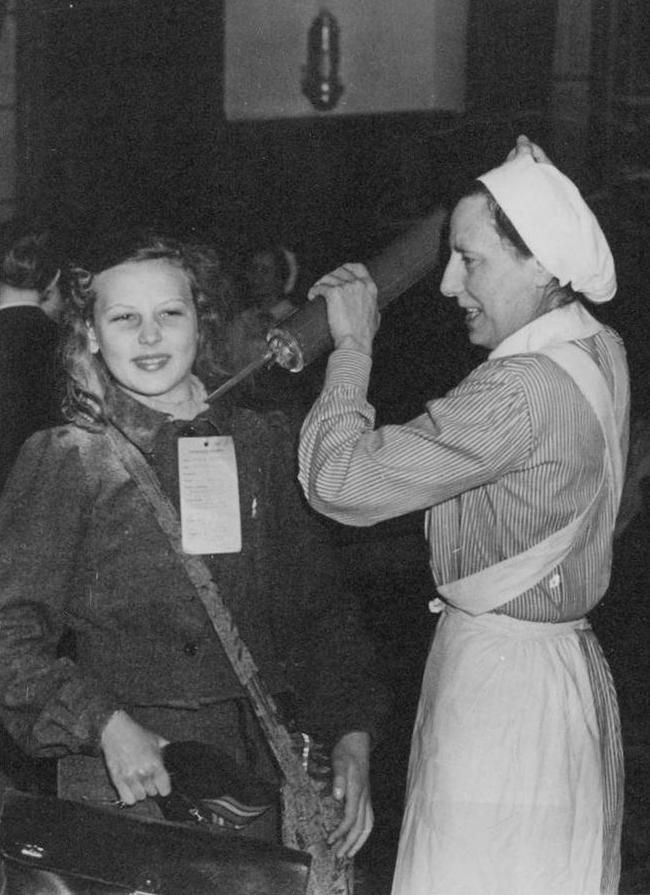
World War II Aftermath in Berlin: Food Conditions--Operation Stork (Winter, 1945-46)

Figure 1.--The Western Allies had trouble getting sufficent food into their sectors of Berlin and the situation promised to get worse with arrival of Winter. Not only was food short in Germany as a whole, but the collapse of the German transport system made deliveries to Berlin diifficult. The British launched Operation Stork (October 1945). The objective was to temprarilu move children out of Berlin and find hm temporary carewith families in rural areas of the British occupation Zone where food was more avilable. The press caption here read, "'Operation Stork'--Berlin children evcuated by the British: Under the name 'Operation Stork' A large scale evacuation of German childrenfrom Berlinis carried out by the British authorities there. The purpose is to prevent starvation among the children this winter. They will be distributed in the British Zone. 'Ugh!' Unpleasant but necessary. at the assembly pointthe children are sprayed woth D.D.T. deloushing powder by German Red Cross nurses." Notice the tags each of the children were given. The photogrph was dated October 29, 1945.
|
|
We note references to Operation Stork in Berlin after World War II. The term Stork has been used to name several humanitarian efforts. The first such effort we are aware of was a British effort to feed German children during the Winter following the War. We have not been able to find a good overview of the program, but have found a few bits and pieces. What we have founds suggests it was a British Army program. The 7th Armoured Division (Desert Rats) in Brlin were involved. So was Save the Children and the German Red Cross. We note U.S. Army trucks being used. Some reports suggest it was a program for Berlin children, but Pathé News seems to suggest that other cities were involved. Food was a real problem or West Berlin so the idea of the program was to get the children out of the British occupatiom zone of Berlin and find country families in the British Sector of occupied Germany to care for them. The Allied occupation zones were still separate. There were sad partings at the assembly points in Berlin. The Pathé images seem to show a very happy group of children involved in the transport phase and with their host families. Transport was a problem. We note both trains and army trucks being used. The children were aged 4-14 years old. Younger children were not allowed because of the interensive care required by the youngr children. Some mothers were allowed to participate, but because of transport shortages, only one mother for every five children. We even see soome pooches being brought out with the children and were tagged like the children. . Food was not the only problem. Berlin was a vast piles of rubble. Sanitation systems were destroyed along with the rest of the city. As a result the children had to be deloused before transport to their winter care homes (figure 1). The British army officer who conceived the idea is now irrevocably known as 'Stork' throughout the whole British Army. The British hoped to bring some 60,000 children out of their zone in Berlin for the winter. We are not sure how many Berlin children actully participated. Food was reltively more available in the British occuption zone of Germany, especially in the countryside. The British at first reported that mothers were reluctant and rumors circulted about child stealing and concentration camps. [Maguire] Participation was voluntry, but many mothers eventually consented. We see others and old men seeing the children off. (Military age men were either dead or in Soviet POW camps.) A Pathé newsreel shows the childen being moved and brought to welcoming homes who volunteered to host the children in the countyside for the Winter. The Pathé description reads, "Operation stork is the evacuation of children from the devastated German towns to the country. C/U Children and a dog with evacuation tickets attached to them. Most of the children are smiling and laughing. Not sad evacuees. C/U shoulder patch of the S.C.F. (Save The Children Fund). Woman from SCF talks to a young girl who holds a large doll." [Pathe]
Sources
Maguire, Paul. "British feed chhildren from Brlin: 'Operation Stork'," The argus (Melbourne) (Novembr 15, 1945), p. 2.
Pathé. "Refugees onto train AKA Operation Stork 1945," 2056.05.
CIH

Navigate the CIH World War II Pages:
[Return to Main conditions in Berlin after the War: Food]
[Return to Main conditions in Berlin after the War]
[Return to Main Berlin after the War page]
[Return to Main Cold War Berlin page]
[Return to Main World War II German aftermath page]
[Return to Main World War II German page]
[Return to Main World War II page]
[Biographies]
[Campaigns]
[Children]
[Countries]
[Deciding factors]
[Diplomacy]
[Geo-political crisis]
[Economics]
[Home front]
[Intelligence]
[POWs]
[Resistance]
[Race]
[Refugees]
[Technology]
[Bibliographies]
[Contributions]
[FAQs]
[Images]
[Links]
[Registration]
[Tools]
[Return to Main World War II page]
[Return to Main war essay page]
Created: 1:03 AM 8/1/2016
Last updated: 1:03 AM 8/1/2016



